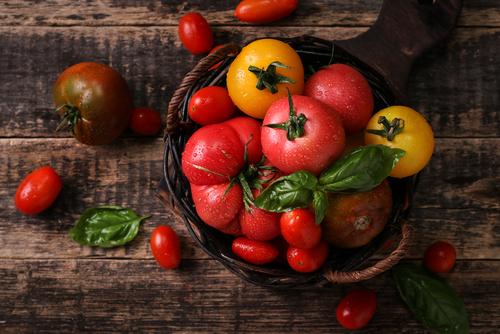Here we are in the middle of winter in the northern part of the country, and obviously it's not a great time to be finding locally-grown (or even California-grown) tasty tomatoes. Anyone who loves the flavor of red ripe tomatoes knows well that you're not going to find them in your local supermarket this time of year (Sure, you can get tomatoes shipped from the southern hemisphere, or those grown in greenhouses, but somehow the taste just isn't the same as those grown in New Jersey in July or August (or even in your backyard). And let's be honest, the chances that you'll get a great-tasting tomato at your local supermarket is pretty low at any time of year! That's at least partly because tomato breeders have concentrated on "shippability", breeding fruit that can withstand the rigors of transport. And now, a new study in the journal Science, tells us why.
In this study, a collaboration between U.S., Chinese, Israeli and Spanish researchers, the scientists investigated nearly 400 varieties of tomatoes — modern (i.e. commercial), heirloom, and wild types. They identified chemicals which provided the flavor "notes," testing them with panels of consumers. As might be expected, they found that modern varieties contained fewer and smaller amounts of these chemicals.
Further research identified many of the genes that control the expression of these flavor chemicals — which included sugars, acids and volatile compounds (those that quickly evaporate into the air). Thus, this research sets the stage for returning at least some of the flavor that had been sacrificed when breeding sturdier varieties.
But there is just one stumbling block — the lead researcher, Dr. Harry J. Klee from the University of Florida said that they would use traditional breeding to create the new tomatoes — even though genetic engineering would provide the better-tasting fruit more quickly. He was quoted "I don’t want people to not eat a great-tasting tomato because they’re scared of it” . So here we see that the anti-GMO scare-mongers have had their desired impact, which will make the rest of us wait longer than necessary before we can savor that great tomato flavor — even in the supermarket variety. Too bad.




